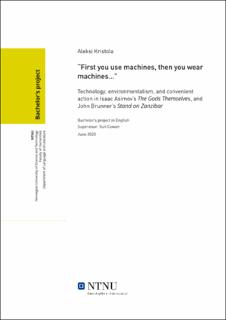| dc.contributor.advisor | Cowan, Yuri | |
| dc.contributor.author | Kristola, Aleksi | |
| dc.date.accessioned | 2020-07-28T16:00:34Z | |
| dc.date.available | 2020-07-28T16:00:34Z | |
| dc.date.issued | 2020 | |
| dc.identifier.uri | https://hdl.handle.net/11250/2670347 | |
| dc.description.abstract | I Brunner og Asimovs fortellinger, er teknologi et ideologisk verktøy for dominans over naturen. Dette fremmer narrativet om mestring av miljøet, noe som gjør oss ut av stand til å forestille en fremtid uten fossilt brennstoff. Romanenes problematisering av «den andre» viser at mennesker tenderer til å tenke om seg selv som tenkende maskiner enn følende dyr. Essayet drøfter også om det finnes en mulighet for at disse romanene forandrer diskursen rundt miljøaktivistisk tenking og praksis. | |
| dc.description.abstract | In Brunner and Asimov’s stories, technology becomes an ideological tool of dominance over nature, perpetuating the human narrative of eco-mastery and conquest for convenience, ultimately rendering us unable to look past technology to imagine a future without fossil fuels. The novels’ problematizing of the ‘other’ shows that humans tend to rather think of themselves as a thinking machine than a feeling animal. The essay also considers whether there exists a possibility of these novels to alter conversational landscapes in that they allow readers to visualize new forms of environmentalist thought and action. | |
| dc.publisher | NTNU | |
| dc.title | “First you use machines, then you wear machines…”: Technology, environmentalism, and convenient action in Isaac Asimov’s The Gods Themselves, and John Brunner’s Stand on Zanzibar | |
| dc.type | Bachelor thesis | |
